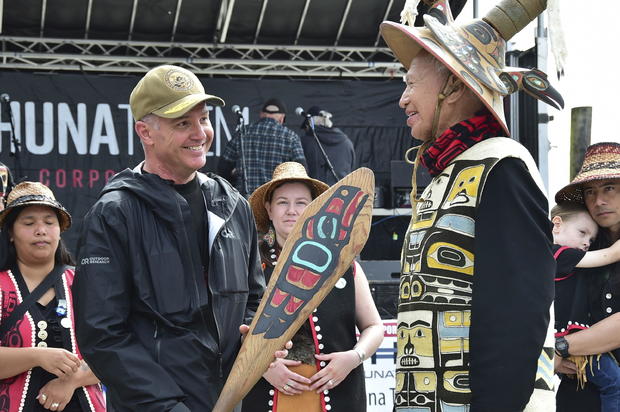Shells fell on the Alaska Native village as winter approached, and then sailors landed and burned what was left of homes, food caches and canoes. Conditions grew so dire in the following months that elders sacrificed their own lives to spare food for surviving children.
It was Oct. 26, 1882, in Angoon, a Tlingit village of about 420 people in the southeastern Alaska panhandle. Now, 142 years later, the perpetrator of the bombardment — the U.S. Navy —has apologized.
Rear Adm. Mark Sucato, the commander of the Navy’s northwest region, issued the apology during an at-times emotional ceremony Saturday, the anniversary of the atrocity.
“The Navy recognizes the pain and suffering inflicted upon the Tlingit people, and we acknowledge these wrongful actions resulted in the loss of life, the loss of resources, the loss of culture, and created and inflicted intergenerational trauma on these clans,” he said during the ceremony, which was livestreamed from Angoon. “The Navy takes the significance of this action very, very seriously and knows an apology is long overdue.”
While the rebuilt Angoon received $90,000 in a settlement with the Department of Interior in 1973, village leaders have for decades sought an apology as well, beginning each yearly remembrance by asking three times, “Is there anyone here from the Navy to apologize?”
“You can imagine the generations of people that have died since 1882 that have wondered what had happened, why it happened, and wanted an apology of some sort, because in our minds, we didn’t do anything wrong,” said Daniel Johnson Jr., a tribal head in Angoon.
The attack was one of a series of conflicts between the American military and Alaska Natives in the years after the U.S. bought the territory from Russia in 1867. The U.S. Navy issued an apology last month for destroying the nearby village of Kake in 1869, and the Army has indicated that it plans to apologize for shelling Wrangell, also in southeast Alaska, that year, though no date has been set.
Read more at CBSnews.com




